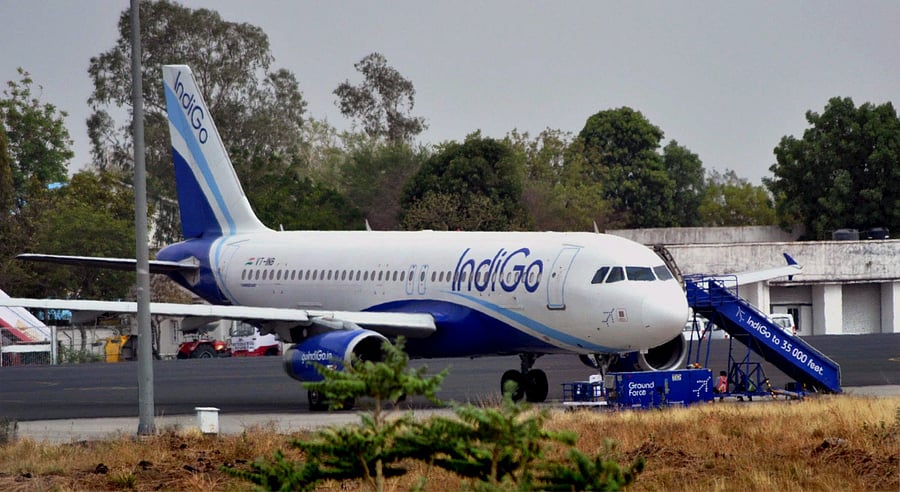
Representative image of IndiGo flight.
Credit: PTI Photo
India’s largest airline IndiGo is looking to induct 22 aircraft from the secondary lease market after the grounding of more than 40 Airbus A320 Neo aircraft powered by Pratt & Whitney (P&W) engines.
Sources close to the matter told DH that DGCA has for now given the airline approval for wet leasing 11 aircraft of SmartLynx Airlines, a Europe-based ACMI (Aircraft, Crew, Maintenance, and Insurance) charter and cargo airline. The other aircraft will be on a dry lease.
“Discussions are ongoing about the wet leasing, but we have not received approval yet,” a company insider said.
This comes a day after the US aerospace and defence group RTX, which manufactures P&W engines said that it will have to recall 600-700 engines from 2023 to 2026, leading to the grounding of an average 350 aircraft between 2024-2026. In July, RTX said a rare powder metal defect could lead to the cracking of some engine components and called for accelerated inspections affecting 200 engines by mid-September.
After this, the company said it was assessing the impact on its fleet due to troubled P&W engines and it expects a fall in the second quarter. "P&W's engine issues will affect some of our aircraft as well," Gaurav Negi, the airline's chief financial officer, said while speaking in the post-earnings conference call on August 2. The airline had also revealed it intends to add 25% capacity in Q2 of FY24- an increase of 6% as compared to Q1
“The airline desperately needs aircraft because the grounded fleet has started affecting Indigo’s bottom lines. It has gotten bookings with passengers and needs more aircraft to fulfill that. They are talking to all competing airlines for aircraft,” another source aware of the matter told DH.
Indigo has been looking to lease older generation A320 Neos without the P&W engine to tide over its engine woes and add flights in the busy winter season.
“Goes to show that there is a severe shortage of aeroplanes in the market, which has been further aggravated by the technical issues on P&W engines. A wet lease is a good short-term solution though not ideal in the long term as passenger configuration differences can cause issues with passenger comfort and maintenance requirements/spare parts supplies,” said Alok Anand, chairman and chief executive officer of aircraft asset lease management company Acumen Aviation.
“With the continuous rise in travel demand, we keep evaluating all possible measures to cater to our customers’ needs,“ IndiGo said in a statement.
A wet lease arrangement, in which a lessor provides pilots, crew and engineering support to a lessee, is costlier and could lead to a possible hike in operational cost. Wet leases are permitted in emergency situations to fill passenger capacity shortages caused by aircraft grounding.
The airline, in October last year, received DGCA's nod for wet leasing aircraft for a period of six months. Subsequently, in December, the airline opened reservations for wet-leased Boeing 777 aircraft for the Delhi-Istanbul route. The plane was taken on wet lease from Turkish Airlines.